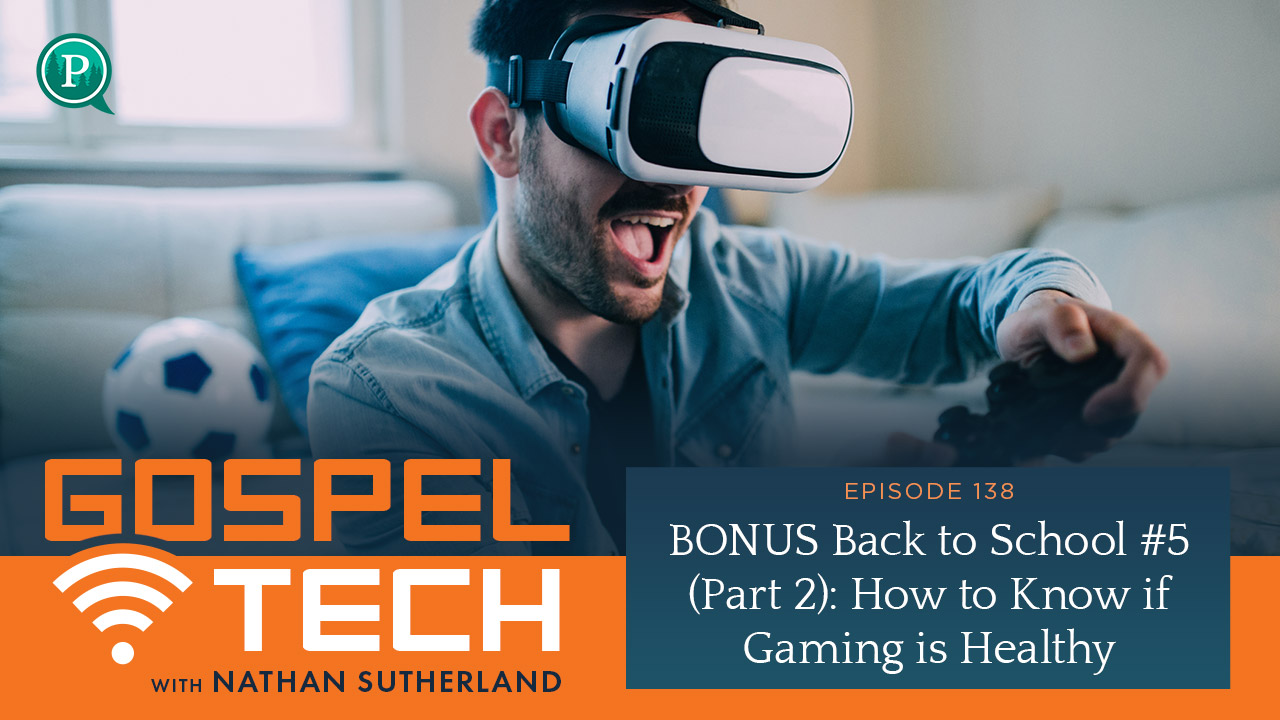Today we wrap up our conversation on finding balance with gaming. We focus specifically on:
- How to know when gaming is healthy
- How to be a part of your child’s gaming world
I also address one of the most-asked questions I get when discussing video games: How do we handle spouses who play video games?
Show Links:
Follow Gospel Tech: Online | Instagram | Facebook | Twitter
Game Design Company: Mightier
Non-Profit providing alternative ways to raise kids in a screen-dependent world: Screen Strong
Transcription:
Purposely. Your life. God’s purpose. Listen at onpurposely.com.
Welcome to the Gospel Tech podcast, a resource for parents who feel overwhelmed and outpaced as they raise healthy youth in a tech world. As an educator, parent, and tech user, I want to equip parents with the tools, resources, and confidence they need to raise kids who love God and use tech.
Hello everyone and welcome to the gospel tech podcast. My name is Nathan Sutherland, and this podcast is dedicated to helping families love God and use tech. This is part two of the finding balance with video games, podcast episode, I guess this is 138 now. and last podcast we talked about how do we know if video game should even be a part? Is it safe? Family expectations, child’s purpose. And then we went through six questions. That’s the first part. Go listen to it because I kind of tease out what that conversation sounds like for, for finding a balanced game and getting through to yeses and understanding in your family what a healthy game will look like.
Now you have a gaming. oh, and I also included that you it’s perfectly reasonable and even expected as a parent, that if you did that and realized, oh man, we already gave the system and it’s not a yes, anymore, these are nos. Going to your child, having that conversation, and lovingly removing those unhealthy parts is absolutely necessary and is acceptable. You can do that. It’s not a human right to have a system. it’s not that you lied to them, because you just learned new information. It’s now progressing that conversation. So, we talked about that last week. Today, here’s what we’re gonna do. We’re gonna talk about how do we make sure it stays healthy and how can you be a part of it?
How can it stay healthy? We’re gonna use a reset here. reset is a simple acronym made to help families talk through healthy tech without just talking about feelings. We want some practical pieces we can address. So, we say son or daughter of mine, you’re playing this video game. How do I know that it’s healthful? We look at a reset. Does this tech impede? Does this video game get in the way of your relationships and responsibilities, your emotions, your sleep, your enjoyment, your time? So, relationships and responsibilities simply mean, does this video game allow you to continue doing the other things in your life that were already important before you started? Or does it even enhance them? Are you able to hang out with people more easily? Does it provide you easy wins with your friend group? Right. Those wonderful reasons that many of our children will give us for why they need these games. All my friends are on there. this is gonna be something I can do. I’m being left out if I don’t play this game. That can be a really cool win. Awesome.
Keep in mind, however that relationships and responsibilities need to be established beforehand. then as they jump into their video game, we shouldn’t just have our friends because of our video games. It should just be something we do with our friends. And then our friends should still be there even when we leave the video game.
So, are those friends you are making through the video game, enjoying the rest of life with you? Or these friends that enjoy video games and you happen to show up occasionally? That’s gonna be an important question. relationships for responsibilities also includes treatment of family. So that might be family expectations with like chores, or family dinner, or family nights together. are the video games getting in the way of that? If they are not, we are all good. If there is a relationship or responsibility, like, Hey, couldn’t help. But notice you quit volunteering at this place, or you’re not showing up for work on time, or you’re not coming down to family meals when we ask you to. Those sorts of things are concerning and now they’re a conversation point for you to go to your child. It’s possible the video game could be an issue with that. It’s also possible the video game’s just symptomatic of a bigger problem. And you actually aren’t concerned about the video game. It’s just showing that there’s an issue and you have something else to address. Go to your child in loving, concern and address that, and figure out what is happening. you also want to, so we did relationships and responsibilities. Emotions. Video games can impact emotions. They can make you rage. make you really mad when they don’t go the way you’re supposed to. Throwing controllers, slamming things, shouting obscenities. These are concerns that we as parents have because we want to address them lovingly and talk about how we handle disappointment.
You are absolutely practicing rage. It’s a very real experience in a video game. Some games are designed to just be rage inducing, but it’s not something we want to encourage or celebrate. So, we go to our child, and we have those conversations.
Maybe video games are a nice way for your child to learn how to lose. And emotionally they’re very positive. They’re a way for your child to learn how to channel their strong feelings. There’s actually a game design company called Mightier, and they have a really cool process that teams with a heartbeat monitor. So, they wear this heartbeat monitor on their wrist. They play the game, and as their heartbeat and frustration levels, escalate the screen reacts accordingly, and then it helps them through breathing exercises. so, it’s a, there are some very cool things. You don’t just play it with any old call of duty game. there’s a specific set of games that go with it. But games can be a wonderful place to learn how to lose well, if we use them like that. If we use them as an actual game and not as an escape or some kind of self-medication distraction.
Emotionally, we wanna make sure they’re helping and not hindering. then we get to sleep. If your child has any form of video game in their room, it’s impacting their sleep. They’re saying it, they’re playing it too late. They’re waking up in the middle of the night and they’re playing it. They’re getting up too early. It is distracting them because they see it and they’re thinking about it, and they want to get back to it. Those games need to be in a public space. They do not need to be in a sleep space. There’s zero research talking about the benefits of video games in a bedroom. plenty of information about, especially the, well video games in general in the bedroom, but also internet connected devices in the bedroom are not helpful. So, we wanna look at sleep for our, is this healthy question. We wanna look at their enjoyment. And enjoyment is important because, Video games being so attractive, they’re a very powerful form of drool. Tech. many times they have lots of ways to draw us in. We talked last episode about how really expansive games can use our curiosity and our desire for adventure, to draw us into these beautiful storylines off oftentimes, but sometimes we get stuck in that storyline. And then sometimes we get so invested in that storyline that it becomes more exciting in the real world. Our wins come easier. The world is more beautiful. we feel more successful in it, and it can get a really negative spiral going where we quit doing hard things in real life because it’s easier to get the same win feeling from a game. And then that starts to hamper our satisfaction, our contentment, our joy in real life, our investment in real life. And this is really what enjoyment is trying to get to. There were things that your child enjoyed doing until they started this game. And if you watch those things wilt, they used to practice this instrument. They used to get into this hobby. They used to invest in this particular outlet. And now they don’t because they, we have all of their time and attention to this video. That’s where we’re concerned. Cuz video games should be done well, be like any other game. They should make your child alive. They should give laughs; they should give fun competition and then you should walk away and it just happens that it happened on a screen.
And yet that’s not always the experience of families of people who love video games. And doesn’t mean the video games necessarily bad. It means it may not be a good fit for this season, or for this individual. this game just might be too much to handle well. Enjoyment will show you that. Please hear me on this. And I’m just gonna say it one more time, because I, I do feel this point is often misunderstood. We all have shifting enjoyment. So, just cuz your kid doesn’t like playing with their stuffed animal anymore and they’d rather play super smash brothers or whatever, doesn’t mean that that’s an unhealthy shift. What I’m saying is your child used to have a host of interest. They used to be vibrant. And now the only thing that seems to bring light into their eyes is this video game. That’s what I’m talking about. It’s become the pinnacle of their life. They’re doing everything else to get back to it. That’s a concern. And a place for you to have a conversation with them. I’m not saying the video game is even doing that. It might be they went through a bad breakup at school. It might be that they’re getting bullied. It might be, they saw something online and they’re experiencing shame. And this video game is just an easy way to forget about all that stuff. I don’t know. You are the parent, the loved one, the teacher, the mentor, the grandparent. Jump into their life and start asking intentional questions because a reset is gonna expose that.
You also then look at the time. We talked about time in the last episode being an indicator of health. In this case, we’re just looking at time in terms of satisfaction. Whatever your agreement is, whatever you’ve said, you get to play, whatever, 30 minutes, three days a week child. Make sure that the time satisfaction is there. So, yes, the time, parameters need to be followed. So, your child is given that time. They can play it. You need to have expectations. This game is turned off when this time is over, right? So, if you have 30 minutes, it’s off in 30 minutes. So, maybe you go 35 to give them five minutes to wrap it up. That’s great. But the window’s really important. That’s gonna be a digital trust issue, and it’s going to be part of how we build responsibility in this. So, on the digital trust side, this is that we are trusting our child and they’re gonna show maturity and responsibility by keeping that timeline without us having to heckle them a lot about it. and on others, the, the responsibility side, we are going to handle video games as part of life. If we’re letting our child go in there and we’re showing that it’s healthy on a reset. So, we, we are on the tee of the reset right now, and that it’s something we’re going into intentionally. We look to make sure it’s safe for our family and that the game is reasonable. And, and that’s our expectations, then in the reset spot, we’re building responsibility and ensuring health with this. Many times, as parents, we say, well, child of mine, if you get good enough grades, or if you do what we ask the first time, then you can get to video games. And I love the people over at screen strong, brought this point up and I absolutely love it. So, I’m gonna repeat it. and they’re like, it doesn’t make any sense for us to encourage our children to do what we want by rewarding them with something we don’t want. And many of us, that’s how we handle video games. We go, well, I don’t like video games. So, because I don’t like them, I’m gonna hold them as the last thing you get. And you have to get through all this other stuff I do want. So, you have to practice your piano and you have to go to school and you have to finish your homework, you have to be nice to your siblings… and as long as you do that, then I’ll reward you for doing all the stuff I do want, by giving you something I don’t want you to have. Which is a really unhealthy way to go about it because your child is being rewarded to get through all this other stuff that’s really important. But all they know is that they’re getting back to this thing that they really want. and it is, it is building habitually that this thing is kind of the top of the mountain for them.
So, instead, what we’re gonna do, parents, is we are going to say, child of mine, we’ve agreed on this system. We’ve agreed on this game. We’ve agreed your reset is currently healthy. Therefore, here’s your time window from four to 5:00 PM, three days a week. Or from 5:00 to 6:00, whatever, from 5:30 to to 6:00 , whatever time amount, and however many days you’re writing it down on the calendar. Now it doesn’t mean they cannot be moved. You can remove them. If someone is absolutely losing their guard and go, Hey, listen, we need a little more time. I believe that this extra stimulus, not as a punishment now, cuz I’m mad at you, but because this would be an unhealthy choice. Video games are going away. You need to do something lower stress, lower stimulation. You just need, maybe need to go to bed early. like, you just need your time. Video games are a bad choice this week. That’s fine. But we’re not doling them out as we see fit. We’re steading it down and saying, Hey, you get this amount of times to play. This is how long you can play each time. You’re gonna show your responsibility.
We can talk about more time if this isn’t, we, we need to talk about what that would look like. And there is an upper limit for how much time you should play. If your kid’s like, well, I need five hours a day to, for this to even matter, you’re gonna probably need a month without video games to really reset what fun looks like and help them experience joy in the real world. They’re probably over stimulated and, that’s too. for your child to be doing in a day. but in terms of this conversation with a reset, can they hold the time limit, and can they responsibly use the time that they’ve been given? because that does need to be part of how your family is dealing with video games, and the healthy, healthy progression of young adults into adults who know where their limits are with video games.
So, that’s the reset piece. How do we know? If you get like a one out of five hole, you know, what it is impacting relationships or it is impacting their enjoyment or whatever it is. That’s not, a reset isn’t meant to help you win the fight. It’s actually to help you fight for your child. So, you can now go to them with a specific and say, Hey son or daughter of mine, I love you. I know you love, really love this game. I’ve noticed when you play, this behavior shows up or this thing happens. Can you explain that to me? they may not even know what happens. They might have a reasonable explanation. They might have a bunch of excuses that start to show you. Well, that’s interesting. Explain that to me. And you might follow that thread down some rabbit hole that leads you to something you didn’t even know was going on, and that will be wonderful. please do pursue those conversations and pursue your child lovingly in that. If you get to a spot where you go, you know what? This game is actually the problem. The reset is pointing to there’s some aspect of this game we just didn’t know. Anna and I had this with a show that our children were, were watching. It’s a fine show. We did all the research. There’s no bad content in it. it’s educational, it’s pace appropriately, but there’s just something about the show… every time our kids watched it, it just got more aggressive. they started talking back, they started playing way more rough and unkind, and we’re like, all right, like for this, for our kids in this season, this show is not a good fit. So, what did we do? We took the biblical, encouragement of Jesus in Matthew 5:18. And we said, this is causing our kids to sin. It’s not even sin in and of itself. The, the show is not bad, but our kids are being disrespectful. That’s sin. They’re being unkind. That’s sin. we are going to remove this thing lovingly and replace it with something else. And so, we picked a new show genre. And so, they still keep the same amount of time they can watch a show, they just get a different show now, and it’s been great. It, problem went away and that’s not behavioral modification. We’re not just manipulating our children. We are addressing what is showing up as a sickness, recognizing sin when it appears and knowing that sin leads to death. It leads to a really negative direction. Not hypothetical, metaphorical death. Physical and spiritual death will occur when we allow sin to sprout and take root. And we don’t wanna see that for our kiddos. So, we lovingly remove unhealthy.
With our kids, if the video game becomes unhealthy either it’s a trigger for unhealthy behavior, meaning they do it and then unhealthy things are just getting trained into their brains, or it’s physically unhealthy itself. This content is unhelpful for our kids, or some other aspect on the unhealthy spectrum. You would look for it in a reset, and then you go, do we need a new game? Is there just a game that’s a better fit than this game? How can we find that? Do we need to go non-digital? Do we need to go to analog games? Get our board games out and operate at the pace of real life again. A month. Dr. Victoria Dunkley is one who does some research on this. In 30 days is about how long it takes for your child to be able to find satisfaction in real world activities. If they’re talking a lot about how bored they are in real life stuff, it’s a really good chance that their brain is starting to tune itself to the rapid pace of digital gaming. It can just happen so much faster and louder and brighter that the real world starts to kind of fade. And that’s not what we want for our kiddos.
So, then we’ve looked at a reset and we now have the conversation points. We know that we’re looking at relationships and responsibilities. We’re looking at emotion, sleep, enjoyment, and time. Seeing if it’s healthy or not. We know that we can remove and replace it with a new adventure. Okay. So, we have that piece and that’s fantastic. It’s gonna help your kiddo. You now have something you can do today. If you felt cornered by your kid and felt like you’re being held hostage because you just can’t take away these video games. You’d be the meanest person in the world. Please hear that as a lie. You can remove a video game, but you need to do it lovingly. You don’t just do it cuz you don’t understand it. You don’t just do it because you don’t like it. You need to understand what the problem is with this video game and fight for your child. Go to them and say, child of mine, this is what is wrong. And this is why this action needs to happen. Invite them into that journey with you. Say, what would you, this is a question I use with my eight- and six-year-olds, what would you do if you were a parent and your child was doing this? Okay. And ask the question. It doesn’t mean their answer is right, but I’ve often found that their suggestions are much more intense than mine. so, then I feel sound like a really good guy when I go, okay, I think that’s really reasonable. Here’s what I’m going to do. And I do half of what they suggested. Right. They’re like I ground them forever and be like, all right, cool. We’re not gonna do that, but I am gonna take this game away from a week, for a week. Okay. and I’ve actually done this with board games because turns out board games aren’t magical. They’re still just games. They can consume too much of your mind and heart. And sometimes they cause my children to be disobedient. And so, the game goes away. I go, great. I understand that. Here’s what we’re gonna do. So, you have this conversation of what needs to happen, what a remove and a replace looks like. And you, as the loving parent, get to make the final decision. You are not held hostage by this video game.
However, we have our reset. Let’s say the reset is healthy. Your child is doing well. It doesn’t need to remove and replace at this point. The, the games don’t your child is doing great. So, then we need to talk about, what does it look like to be a part of your child’s gaming world? This is specifically for those parents who do not like video games at all. You just, you don’t see a purpose of ’em. You feel like a catastrophic waste of time, but your child is into it. they are, you’ve picked the system that matches your families. the safety family expectations, child, goals and purpose. You’ve gone through the six questions and ensured the games for that system are matching what your child needs. And you’ve looked at a reset and you can say, yeah, out of five, my child’s a five outta five. They’re doing great. There’s no, there’s no problem with my child playing this game. I just don’t like it. It’s not interesting to me. Great. Parent, this is for you. You are gonna go to your child and you’re gonna ask three questions. Actually, this is also for, if you are a gamer, you still need to do this, because it’s possible that you make games more about your interests. And this is specifically about getting that trust built and that relationship built with your child. you are sending your child into a digital world. They’re hanging out in that digital cul-de-sac, and you need to go there with them, and learn from them and experience some of what is out there so that you can know more about what’s making your kiddo tick, and who’s engaging them and what lessons they’re learning and help them think critically about what’s happening in these games.
So, the first thing is, ask them to show you how, how it works. This can be asking them about their favorite level or the biggest challenge they’ve faced or what’s happening or how they can do something. Like, there’s limitless possibilities on what you could ask. And if you know nothing about video games, there are no bad questions. Just how do you open a door? How do you talk to people? How do you fight something? How do you know if you won? What happens when you win? Like, do you get points? Like what, just, what is happening? Ask them any of those questions and sit down with them and let them show.
Okay, second thing would be to ask them to show you how to do it. Like, oh, could I try, could you show me how to fight that first boss? Or could you show me how to, how to win this race or use that ability? Like, I just want to know if I can do it. And that’s a really cool way to get a win with your kid, especially someone who is into these games and it’s a spot where they get to teach you. That’s a really cool thing as a kid to show your parent how to do something. And it’s a good chance that if you’re playing halo, you’ll just stand in a corner, staring at the sky and eventually blow yourself up with a grenade. But the point is you blew yourself up with a grenade playing with your kid, and you did it terribly, and they loved that.
Okay. So, get some of those shared wins and the third thing would be to do it together. so not just, can you show me how to do this, but can we do this experience together? Can we play this level together? Can we compete together? Can we do something in this? can we watch a video on this game together? Whatever that is going to be an important conversation for you to have, because it’s giving value and investment to your child. So, be thoughtful about how you can ask those three questions. The, can you show me, can you teach me, can we do this together? because you’re stepping into their world, like Christ stepped into ours and took on flesh despite his being God, for the purpose of taking on our sin. Living a perfect life, dying and rising again so that now we don’t just get salvation. we get in dwelled by the holy spirit of God. We get to be righteous, and the holy spirit of God lives in us. So, we can go and love people like our children, and who are, who very well may be rebellious, little sinners right now and not know the love and joy of God. So, we get a model that for them, by stepping into their world, even if it doesn’t interest us. Or if it super interests us by showing value for what interests them, and not just running after our personal interest, but actually using this as a bridge into their life. So, we have a reset, we have three questions we can ask, and my hope in giving these to you is to give you easy win with your child, and to make sure that they have balance in their gaming. I’m not saying you have to play games. I want you to hear this. I’m not saying video games are a necessity. you can say no to games. You, you can have, good reasons you can just have spidey senses. No is a perfectly reasonable answer to any technology, and video games are included in that. however, You do need to eventually progress the conversation and model for your child, how you got to know what your reasoning for that is and what you’re doing instead. I love Greta Eskridge’s quote on this, the idea of adventures, because I think that’s really what this balance comes down to is where are we finding our satisfaction, our adventure, and her thought on adventures:
Adventures are the vessel, not the journey itself.
And that’s so true with video games. They should always lead us to a place of amazement; to a place of wonder and to other activities that also bring out amazement and wonder. That reset, they should help us engage in our relationships and our responsibilities. Video games should help us experience enjoyment outside of video games. They should, make us so amazed that when we go to other situations, we go, oh, you know, this is what the video game was talking about. Right. It was a sign pointing towards something. It wasn’t the something in and of itself. We don’t want to stop, just because we’ve progressed to a signpost along the journey.
Two examples on this, and then I’ll, I’ll wrap this up. a pastor, our pastor, Rob, from our church has an awesome example of this. And he’s like, when you are using things that bring amazement in this world, even things as good as like raising kiddos, if we make those, the ultimate thing without recognizing they really point us back to God and his love for us and his goodness and his amazing glory, if we don’t use these for wondering for worship, it’s like driving to Disneyland and stopping at a sign that says Disneyland 20 miles, and stopping there and acting like that’s Disneyland. Right? You got to a sign that pointed you to something greater and you’re like, woo, this sign’s incredible. Right? So, when we experience video games, we should go, wow, this is amazing. Like someone put an incredible amount of work into this, and I love the scenery. I love the gameplay. I love the snappiness. I love the graphics. I love the challenge. I love the storyline. I love the characters. Those are all things God equipped people to make. There are world class storytellers and artists and designers who are involved in these things. So, please enjoy, enjoy the soundtrack. Enjoy everything about that game and recognize that’s not the end in itself. It’s pointing you to someone much greater who designed you to be able to enjoy that. The that’s why the game is so engaging. That’s why these games are so captivating. They’re speaking to a part of us that God made specifically to experience wonder to point us back to him. I think, C.S. Lewis says this really well, when he says fairy tales far from doling or emptying, the actual world gives it a new dimension of depth. He does not despise real woods because he has read of enchanted woods. The reading makes all the real woods a little enchanted. And I think that’s a beautiful picture because it’s also a way we can test ourselves and say, all right, am I enjoying this experience and now it’s coloring the real world around me. and so, when I go to the woods, they feel more magical. And when I see the mountains, they seem more colorful, and I experience more on amazement at nature and relationships and just the beauty and, structure we’ve been given. Cause I’ve experienced these other stories through video games. Or do the woods feel lonely and the mountains feel sad because nothing really sparks wonder like the video game. The video games now become the ultimate thing instead of assigned, pointing to the ultimate thing. So, this is our conversation we get to have with our kiddos about video games.
Are we using video games? Are they using us? When we talk about balance with video games, if we hearken back to our previous conversation, we remember that we’re gonna ask, is it safe? Is it a good idea for our family? Does it fit our child’s goals and purpose? We look at the six questions for a video game. And then today we talked about, all right, how do I know once my child is playing if it remains healthy? We use a reset, and we look at relationships and responsibilities, emotion, sleep, enjoyment, and time. And we dive in with our kiddo. We go out in the cul-de-sac with them of this digital world, and we ask them to show us how to do it. We ask them questions about it, excuse me, then we ask them to show it. Show us how to do it, to teach us. And then the third one would be, can we do this together? that the entire point of doing all of that is to build that trust with one another and model for them, what it looks like to be healthful. In and out of a digital world because we understand at the end of the day, All of these examples of wonder are supposed to point us to something beyond the game in itself. That’s not a stopping point. We don’t have to play video games. Your kiddo can grow up and be a well-rounded, amazing person without video games. And they can do the same thing with video games. The goal isn’t yay or nay on video games. The goal is, recognize your purpose in Christ. Recognize that this isn’t a spot you just get to stop and stay. Video games don’t get to be an escape in the turning in, on ourselves and letting the world dull. They should be an escape that points us outward and recognizes this world isn’t all we have to live for.
So, I hope that that makes sense and is encouraging to you and that you feel empowered by this to go and talk to your kids about video games. I hope you understand why split this into two halves. There’s a lot of info there, but then I hope that’s encouraging, and that it, man, that at the end of the day, you can think of your child or your spouse and your relationship. and be encouraged to do that, ooh, I did.
Let’s add this since this is a bonus episode. I’m gonna to run on this real quick. I just, I was gonna finish this episode right now and I wanna say one more thing. I get asked a lot about spouses, and I get asked, Hey, do you talk about video games and video games specifically in marriage? And I don’t. And here’s why; video games are tricky and they’re very personal for me. And they’re very personal for most relationships. I will simply say this, on the relational marriage aspect, video games, all the things we just talked about apply to marriage as well. So, you should make sure that it’s safe for your family, that it fits your expectations and that it fits your spouse’s and your marriage goals, and purpose. So, you are two becoming one, you have a new purpose. You are a new family and entity before the Lord. And that is your priority. Son of God is your first identity. and then your second is married spouse. so, in light of that, when a spouse has a concern, that concern now gets the weight. I’m not saying video games are even gonna be the problem in that. Oh, by the way, reset also applies. Wonderful way to address your spouse. Again, we’re in a marriage relationship. If you don’t feel like you can approach your spouse with a reset. I think that in itself is a conversation point. To say, Hey, I don’t feel like video games are even an optional conversation. That this is somehow like a God given expectation that these things are going to exist in our marriage. So, I think a reset of those five things is gonna be important.
But to be able to approach your spouse and say, I have a concern, right? spouse, if you know that your spouse has a concern, that is weight enough for it to be addressed. It doesn’t mean they have to go away. I’m not saying you have to get rid of them. I’m telling you just like your child being interested in video games, means video games now deserve space at the table to be discussed. Whether or not you choose to bring them, they’ve earned airtime in your family’s conversations.
The same is true with marriage. if your spouse is bringing up that they feel neglected because of your gaming, whether or not that’s justified in your opinion, or in reality, it has to be discussed. That can’t go on. There is bitterness being brought up there and, neglect is, is a real thing, that we have to make sure that we understand either how we’re communicating our neglect or how we’re missing the fact that we are neglecting a God given responsibility to love our spouse. Husband specifically, you’re called to love your wife as Christ loves the church and gave his life up for her. So, if your wife is not feeling that, it’s either a breakdown in communication because you’re doing awesome and it’s just somehow getting missed, or you’re actually out of line somewhere and maybe video games are symptomatic of you being out of line. They’re not the cause they’re just showing that something else somewhere is off, but maybe they’re the cause. Right. It’s very possible that if video games went away, you would have the bandwidth to recognize the real adventure waiting for you in relationship with your spouse. So, that’s specifically to husbands, but also to married couples in general. please be intentional with your video games. Understand they can very quickly supplant open communication and very quickly cover up areas of rough patches that, they’re not that bad, but they’re only not that bad because we keep going back to video games. And video games are just so much better that they give us this really easy out whenever we ask for it. instead let’s do the hard work of being married. Let’s do the hard work of submitting to the Lord and finding our joy there first and allow our video games to point us back to him, and back to one another and be intentional in that. And if one of the two of you feels like something is off, something’s off. May not be video games, but it needs to be lovingly addressed. So, one spouse I ask that you would be the brave one to initiate the conversation. Other spouse, I ask you to be the one to bravely receive that feedback, and not just have a thousand excuses on why it’s not as bad as what they do and how you need this, because this is your escape. And how you’re just not understood. And they just don’t like, right. We get there quick about anything that is personal to us. let’s prayerfully and humbly understand that this person’s coming in love. Maybe the problem is with them, and we need to get them the help they need, right? The spouse who’s coming to you and saying, you don’t love me as much as your video games. Maybe that’s not true. And your video games are awesome. That still needs to be heard. And you still need to get to the bottom of it. So, all right. Whew. That’s my, that’s my little 2 cents on that. not enough for a full episode, but I, I hope in all of this, you feel encouraged, and you can hear that at the end of the day, it’s not actually about the video games. those are just another talking point. Another win that we can go get relationally to get to the heart of our spouse, of our children and of the people God’s put us around. So, if this is encouraging to you, would you consider sharing it with someone? Send them a text? Share it on social media. Put a link in an email… whatever you gotta do, get it out there and let this be an encouragement to people that are just wanting to love their kids well in this digital world. They wanna love God and use tech, and video games is one way, that conversation can progress. would you consider leaving a rating and a review for us? And would you join us next week as we continue this conversation about how we can love God and use tech.
Follow this podcast:







